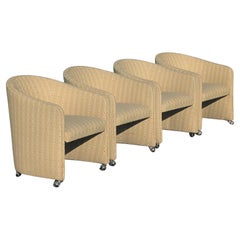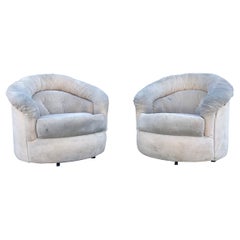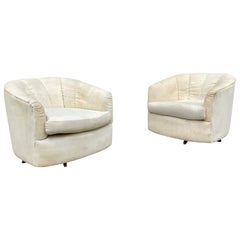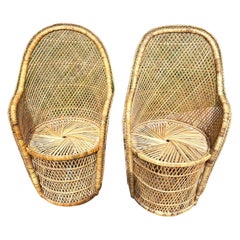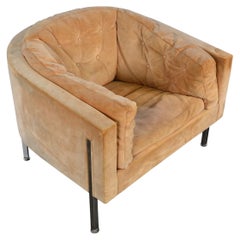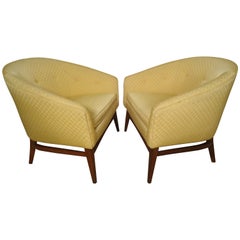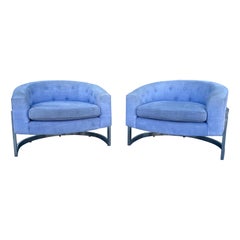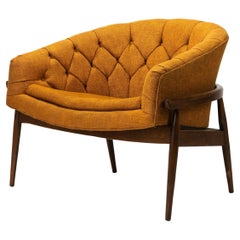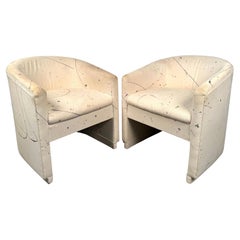Mid Century Barrel Chair
Vintage 1970s American Mid-Century Modern Club Chairs
Fabric
Vintage 1970s American Mid-Century Modern Swivel Chairs
Fabric
Vintage 1970s American Mid-Century Modern Lounge Chairs
Fabric
Mid-20th Century Unknown Mid-Century Modern Chairs
Wicker, Rattan
Mid-20th Century American Mid-Century Modern Chairs
Chrome
Vintage 1960s American Mid-Century Modern Lounge Chairs
Fabric
Vintage 1970s American Mid-Century Modern Lounge Chairs
Chrome
Vintage 1960s American Mid-Century Modern Lounge Chairs
Upholstery, Teak
Mid-20th Century Mid-Century Modern Club Chairs
Fabric
Vintage 1960s American Mid-Century Modern Lounge Chairs
Wood
Vintage 1960s American Mid-Century Modern Lounge Chairs
Fabric
Mid-20th Century North American Mid-Century Modern Chairs
Cotton
Mid-20th Century Mid-Century Modern Swivel Chairs
Fabric
Mid-20th Century Mid-Century Modern Swivel Chairs
Upholstery
Mid-20th Century Unknown Hollywood Regency Chairs
Brass
Vintage 1980s American Mid-Century Modern Lounge Chairs
Fabric, Walnut
Vintage 1970s Mid-Century Modern Chairs
Faux Leather
Mid-20th Century Unknown Mid-Century Modern Lounge Chairs
Upholstery, Wood
Vintage 1970s Unknown Hollywood Regency Side Chairs
Metal, Brass
Vintage 1970s American Mid-Century Modern Swivel Chairs
Upholstery, Wood
Mid-20th Century Mid-Century Modern Swivel Chairs
Fabric
20th Century American Mid-Century Modern Lounge Chairs
Cane, Walnut
Mid-20th Century American Mid-Century Modern Swivel Chairs
Upholstery
Mid-20th Century American Mid-Century Modern Wingback Chairs
Brass
Mid-20th Century Italian Mid-Century Modern Chairs
Wicker, Rattan
Vintage 1970s American Mid-Century Modern Lounge Chairs
Metal, Chrome
Vintage 1970s Mid-Century Modern Swivel Chairs
Faux Leather
Mid-20th Century Unknown Mid-Century Modern Chairs
Wrought Iron
Mid-20th Century Unknown Mid-Century Modern Slipper Chairs
Fabric, Wood
Mid-20th Century Unknown Mid-Century Modern Slipper Chairs
Fabric, Wood
Mid-20th Century Unknown Mid-Century Modern Slipper Chairs
Fabric, Wood
Mid-20th Century Mid-Century Modern Chairs
Brass
Mid-20th Century Unknown Mid-Century Modern Lounge Chairs
Fabric, Walnut
Mid-20th Century Unknown Club Chairs
Cotton
Vintage 1960s American Mid-Century Modern Lounge Chairs
Chrome
Vintage 1960s American Mid-Century Modern Club Chairs
Wood
Mid-20th Century American Mid-Century Modern Lounge Chairs
Wool, Walnut
Mid-20th Century Unknown Mid-Century Modern Lounge Chairs
Walnut
Vintage 1950s Italian Mid-Century Modern Bergere Chairs
Metal
Mid-20th Century American Mid-Century Modern Club Chairs
Walnut
Mid-20th Century American Mid-Century Modern Club Chairs
Walnut
Mid-20th Century Unknown Mid-Century Modern Lounge Chairs
Fabric, Wood
Vintage 1970s American Mid-Century Modern Lounge Chairs
Upholstery, Fruitwood
Mid-20th Century Unknown Mid-Century Modern Club Chairs
Chrome
Vintage 1970s Mid-Century Modern Lounge Chairs
Upholstery
Vintage 1970s American Mid-Century Modern Swivel Chairs
Upholstery
Vintage 1970s American Mid-Century Modern Lounge Chairs
Metal
Vintage 1970s American Mid-Century Modern Lounge Chairs
Metal
Mid-20th Century American Modern Club Chairs
Metal
Vintage 1970s American Mid-Century Modern Lounge Chairs
Velvet
Mid-20th Century Mid-Century Modern Chairs
Upholstery, Teak
20th Century Mid-Century Modern Side Chairs
Walnut, Mohair
Vintage 1970s Danish Mid-Century Modern Lounge Chairs
Metal
Vintage 1960s American Mid-Century Modern Chairs
Metal
Vintage 1970s American Mid-Century Modern Lounge Chairs
Fabric, Silk, Wood
Vintage 1970s American Mid-Century Modern Lounge Chairs
Chrome
Vintage 1970s American Mid-Century Modern Lounge Chairs
Chrome
Vintage 1970s American Mid-Century Modern Lounge Chairs
Chrome
- 1
- ...
Mid Century Barrel Chair For Sale on 1stDibs
How Much is a Mid Century Barrel Chair?
Finding the Right Seating for You
With entire areas of our homes reserved for “sitting rooms,” the value of quality antique and vintage seating cannot be overstated.
Fortunately, the design of side chairs, armchairs and other lounge furniture — since what were, quite literally, the early perches of our ancestors — has evolved considerably.
Among the earliest standard seating furniture were stools. Egyptian stools, for example, designed for one person with no seat back, were x-shaped and typically folded to be tucked away. These rudimentary chairs informed the design of Greek and Roman stools, all of which were a long way from Sori Yanagi's Butterfly stool or Alvar Aalto's Stool 60. In the 18th century and earlier, seats with backs and armrests were largely reserved for high nobility.
The seating of today is more inclusive but the style and placement of chairs can still make a statement. Antique desk chairs and armchairs designed in the style of Louis XV, which eventually included painted furniture and were often made of rare woods, feature prominently curved legs as well as Chinese themes and varied ornaments. Much like the thrones of fairy tales and the regency, elegant lounges crafted in the Louis XV style convey wealth and prestige. In the kitchen, the dining chair placed at the head of the table is typically reserved for the head of the household or a revered guest.
Of course, with luxurious vintage or antique furnishings, every chair can seem like the best seat in the house. Whether your preference is stretching out on a plush sofa, such as the Serpentine, designed by Vladimir Kagan, or cozying up in a vintage wingback chair, there is likely to be a comfy classic or contemporary gem for you on 1stDibs.
With respect to the latest obsessions in design, cane seating has been cropping up everywhere, from sleek armchairs to lounge chairs, while bouclé fabric, a staple of modern furniture design, can be seen in mid-century modern, Scandinavian modern and Hollywood Regency furniture styles.
Admirers of the sophisticated craftsmanship and dark woods frequently associated with mid-century modern seating can find timeless furnishings in our expansive collection of lounge chairs, dining chairs and other items — whether they’re vintage editions or alluring official reproductions of iconic designs from the likes of Hans Wegner or from Charles and Ray Eames. Shop our inventory of Egg chairs, designed in 1958 by Arne Jacobsen, the Florence Knoll lounge chair and more.
No matter your style, the collection of unique chairs, sofas and other seating on 1stDibs is surely worthy of a standing ovation.
- What is a mid-century chair?1 Answer1stDibs ExpertOctober 19, 2021A mid-century chair is a piece of seating furniture that was designed at any point during the middle of the 20th century. Mid-century modern furniture is characterized by pieces that were conceived and made in an energetic, optimistic spirit by creators who believed that good design was an essential part of good living. The mid-century period provided an excellent opportunity to experiment with both functional and decorative forms. Mid-century modern chairs were made with a variety of natural and synthetic materials, combining leather, wood, and cane with chrome, steel, and plastic. Shop a range of vintage mid-century chairs on 1stDibs today.
- 1stDibs ExpertMay 5, 2023To tell if a chair is mid-century, look for labels and markings that indicate its maker. Then, use trusted online resources to determine when the company was active. A certified appraiser or experienced antiques dealer can be of assistance when dating chairs. Iconic mid-century modern furniture designers include Charles and Ray Eames, Eero Saarinen, Milo Baughman, Florence Knoll, Harry Bertoia and Isamu Noguchi. Find a variety of mid-century modern chairs on 1stDibs.
- 1stDibs ExpertApril 5, 2022Yes, Wassily chairs are indeed considered mid-century modern. Although the chair was initially designed by Marcel Breuer in 1925, it was re-released in the 1960s. Shop a collection of mid-century modern goods from some of the world’s top sellers on 1stDibs.
- 1stDibs ExpertMarch 3, 2023Some iconic chairs from the mid-century modern era include the Egg chair by Arne Jacobson, the La Chaise by Charles and Ray Eames and the Womb chair by Eero Saarinen. With their clean lines, organic shapes and simple details, these chairs reflect some of the key features of the style. Shop a variety of mid-century modern chairs on 1stDibs.
Read More
The 21 Most Popular Mid-Century Modern Chairs
You know the designs, now get the stories about how they came to be.
Mies van der Rohe’s Barcelona Chair Shook Modernism and Charmed Hollywood
The enduring appeal of the Barcelona chair is in the details.
Herman Miller Got Its Start in the Office, but Its Legacy Is in the Home
The brand that turned Charles and Ray Eames, Isamu Noguchi and George Nelson into mid-century household names is just as relevant today as it was six decades ago.
May’s Most Popular Interiors on Instagram
Our feed is filled with the world's most beautiful spaces. See the rooms our followers have deemed the best of the best this month.
April’s Most-Liked Interiors on Instagram
Our feed is filled with the world's most beautiful spaces. See the 10 our followers have deemed the best of the best this month.
See How New York City Designers Experiment on Their Own Homes
There are many lessons to be learned from the lofts, apartments and townhouses of architects and decorators in Manhattan and beyond.
Jeff Andrews Captures Old Hollywood Glamour in His Cinematic Spaces
Having created extravagant homes for reality TV’s biggest stars, the designer is stepping into the spotlight with his first book.
New Orleans’ Lee Ledbetter Makes Design Magic by Mixing Past and Present
The Louisiana-born and -bred architect talks to 1stdibs about the art of making timeless places that matter.
